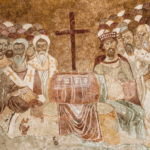To help celebrate the 500th anniversary of the Reformation, TGC Australia ran a series of blog posts on the five solas. Here Andrew Moody kicked it off with a list of seven observations about what it means to regard Scripture as our final authority (sola scriptura).
1. It isn’t a rejection of general revelation, common grace or the idea that there might be truth in other religions.
Believing in Sola Scriptura (scripture alone) doesn’t mean denying that God has revealed himself through other means. The heavens “pour forth speech” (Ps 19) . The testimony of creation removes every excuse humans might offer concerning their own ignorance (Rom 1:20). As Calvin says, creation displays “many bright lamps” that illuminate the glory of its author (Institutes 1.5.14).
General revelation and Scripture belong together. Scripture is a pair of spectacles that ‘gathers up’ the former ‘confused knowledge of God.’
Of course both Paul and Calvin make these observations in a negative context: as sinners, humans naturally suppress this testimony because we don’t want to hear it. But this isn’t a problem with general revelation but with us. As Calvin observes, general revelation and Scripture belong together. Scripture is a pair of spectacles that “gathers up” the former “confused knowledge of God” (1.6.1).
Reformed theology is not about rejecting non-Christian ideas. In the light of Christ (and that’s the key), some of them as are revealed as profound and helpful. As Herman Bavinck writes in an essay on “Calvin and Common Grace”:
The good philosophical thoughts and ethical precepts found scattered through the pagan world … stand for the desire which in Christ finds its satisfaction; they represent the question to which Christ gives the answer; they are the idea of which Christ furnishes the reality.
2. It is a reminder that we need God to speak sure and saving words.
Although Sola Scriptura shouldn’t be set against other sources of knowledge, it certainly does limit their significance.
We humans (including Christians) are continually making wrong assumptions based on our observations of the world. We see a prophet doing miracles and we assume that it means God endorses them. We experience prosperity and we assume that it means God likes our life-choices. We see a widespread movement in the church and assume it’s a work of the Spirit. We feel drawn to a certain person or way of life and we assume that that feeling corresponds to God’s will for our lives.
All of these things might be true on occasion. But the Bible (and experience, surely) warns us that these assumptions are hopelessly unreliable. Sometimes God sends false miracle-workers to test our faith (Deut 13:1-3). Sometimes suffering is more reliable sign of God’s approval (Heb 12:6-8). Sometimes popular church movements are the product of apostasy (2Tim 4:3). Sometimes our desires simply prove that we are messed-up people living in a messed-up world (Rom 1:24-32).
The doctrine of Sola Scriptura insists that God has given us a surer word. It takes its stand on what the Bible says about itself: that Scripture is a light; an eternal reality; a firm foundation (Ps 119:105; 2Pet 1:19; Is 40:8; Matt 7:24). It says that Scripture and Scripture alone is to be our rule of faith. Thus as Article 6 (of the Anglican “39 Articles”) insists:
…whatsoever is not read [in Scripture], nor may be proved thereby, is not to be required of any man, that it should be believed as an article of the Faith
3. It isn’t a denial that Christ is the true Word of God.
People sometimes argue that Sola Scriptura takes something away from Christ. They say that it elevates a book over a person; the written word over the Living Word. Some want to say that Scripture should be regarded as a witness to the Word of God, rather than the word itself.
These objections express legitimate concerns. Jesus really is God’s greatest and truest revelation (Heb 1:1-2). Scripture really is a witness to him. There really is a possibility of being devoted to the book but missing the person (John 5:37-47).
But setting Jesus against the Bible is wrongheaded. The New Testament only exists because Jesus appointed apostles to be his witnesses. The apostolic testimony—empowered by the Spirit whom Jesus sends (John 14:26; 15:26-27)—is an effect of Jesus’ own Lordship and victory. It is the way Jesus has chosen to reveal himself to us.
Setting Jesus against the Bible is wrongheaded. The incarnate Word cannot be separated from the written Word.
Similar truths apply to the Old Testament. Paul suggests that Christ was secretly at work under the events and signs displayed in Israel (1Cor 10:1-11). Peter tells us that Old Testament prophecy was produced by the “Spirit of Christ” (1Pet 1:11). The same Spirit who overshadowed Mary also went before to prepare the way for him. Even more, as that Spirit spoke through the prophets he also shaped the life of Jesus who would later obey and fulfil that word.
So Jesus the incarnate Word cannot be separated from the written Word. The Bible is part of his coming into the world. Jesus comes clothed with his gospel, as Calvin puts it (I 3.2.6). Luther expresses it more memorably still in an “Introduction to the Old Testament”:
Let your own thoughts and feelings go, and think of the Scriptures as the loftiest and noblest of holy things … Here you will find the swaddling-clothes and the mangers in which Christ lies, and to which the angel points the shepherds.
4. It is the key to true spirituality
Some see the evangelical and reformed emphasis on Scripture as mere rationalism—intellectual rather than spiritual. Maybe that’s how it is sometimes.
But it shouldn’t be. If Scripture is the Spirit’s testimony concerning Christ, then reading, studying, meditating-on, and using the Bible is the spiritual path. Listening to Scripture is listening to the Spirit (Heb 3-4). Working hard to understand the Bible is an appeal to the Spirit who enables us to understand his own words (1Cor 2:12-13). Our confidence, as we study, is not in our learning or intelligence, but in the promise of Jesus: “Pay attention to what you hear: with the measure you use, it will be measured to you, and still more,” (Mark 4:24).
This is the heart of reformed spirituality: an experience of “meeting God in his Spirit-given words.”[1] In the words of Calvin:
God did not bring forth his Word among men for the sake of a momentary display, intending, at the coming of his Spirit to abolish it. Rather, he sent down the same Spirit by whose power he had dispensed the Word, to complete his work by the efficacious confirmation of the Word.
5. It isn’t a denial of the church’s significance or authority.
Sola Scriptura maintains that the canon is now closed because God’s last word is the historical Jesus. There can be no further significant revelation because there are no witnesses who “accompanied us during all the time that the Lord Jesus went in and out among us,” (Acts 1:21); there are none with “remembrance all that I have said to you,” (John 14:26).
Here reformed theology parts company with Rome. Catholicism makes the case that the apostolic message was first and foremost a “living tradition”—something given to the church. The church guards an unwritten heritage from the apostles in addition to that recorded in Scripture.
The Catholic version of the apostolic tradition begins to look a lot like ‘whatever we say it is.’
Of course this is suspiciously vague. If there is an unwritten apostolic tradition, how can we know which things belong to it and which are simply pious (or impious) speculation? The Catholic version of the apostolic tradition begins to look a lot like “whatever we say it is.”
And yet there is a sense in which the “living tradition” idea is true. The apostolic message really has been “entrusted to the saints” (Jude 3)—not because it gets to produce new ideas and brand them “apostolic,” but because it has been given authority to “make disciples of all nations… teaching them to observe all that I have commanded you.”
To put it provocatively—the Bible is not enough. The message given through Jesus and his apostles doesn’t survive simply by being written down, it also needs to be passed on through a living succession of disciples, teachers, preachers, parents etc. It needs to be entrusted to faithful people (2Tim 2:2) who can guard it the with the help of the Holy Spirit (2Tim 1:13-14).[2] As Calvin declares in his commentary on 1Timothy 3:15:
[The kingdom of God] is preserved on earth by the ministry of the Church alone. … The reason why the Church is called the “pillar of truth” is, that she defends and spreads it by her agency. God does not himself come down from heaven to us, nor does he daily send angels to make known his truth; but he employs pastors, whom he has appointed for that purpose. … [T]his commendation relates to the ministry of the word; for if that be removed, the truth of God will fall to the ground.
6. It is an affirmation that some gifts are more foundational.
If the last point is true, then the most important gifts given to the church are those which enable her to continue in the apostolic tradition. As Paul’s gift-lists (1Cor 12; Eph 4) move naturally from apostles and prophets (the authorised witness to Jesus) to those responsible for passing that tradition on and helping Christians live it out (evangelists, teachers and pastors etc), so also the church must order her own priorities.
Recovering this emphasis was a great legacy of the reformation and changed everything. It changed the way the church thought about leadership. It knocked pontiffs and prelates off their thrones and elevated preaching. It put the Bible into the hands of ordinary people and encouraged every-member ministry. It debunked mystics, begat literacy, launched revivals, revolutionised pastoral care, spawned missionary movements, fostered democracy and transformed cultures.
7. It isn’t a guarantee of perfect knowledge or perfect practice
None of this is to deny that there have been (and still are) many misapplications of Sola Scriptura. It has at various times been:
- turned into a license for individualism, arrogance and sectarianism;
- taken as an excuse to ignore the wisdom of past generations and other church traditions;
- subverted by poor judgments about secondary matters;
- a pretext for denouncing culture, aesthetics and emotion;
- an occasion for uncritical devotion to star Bible-scholars and preachers.
Sola Scriptura does not promise, and does not deliver, an infallible church. Rather, it challenges an imperfect people to bind themselves to a perfect word about a perfect saviour. It appeals to God to keep on reforming his church through that word by the power of his Spirit.
And history bears witness that it (for want of a better word) “worked.” The reformed doctrine of Sola Scriptura took the church back to the source. It broke through the accretions of the ages and re-exposed the gospel of the apostolic era. It rejuvenated the living tradition. It placed the church in the path of the Holy Spirit and received his blessing.
Let’s pray that he would do it again.
See more TGCA articles on this topic here and here.
[1] P. Adam, Hearing God’s words: Exploring Biblical Spirituality (Downers Grove: IVP, 2004), 45
[2] Kevin Vanhoozer suggests that it would be helpful in this light to identify a sixth “virtual” sola ecclesia. K. J. Vanhoozer, Biblical Authority after Babel: Retrieving the Solas in the Spirit of Mere Protestant Christianity (Grand Rapids:: Brazos Press, 2016), 29















